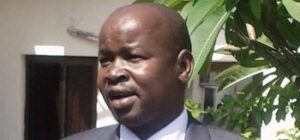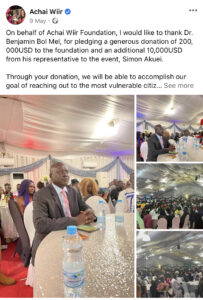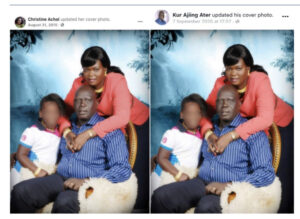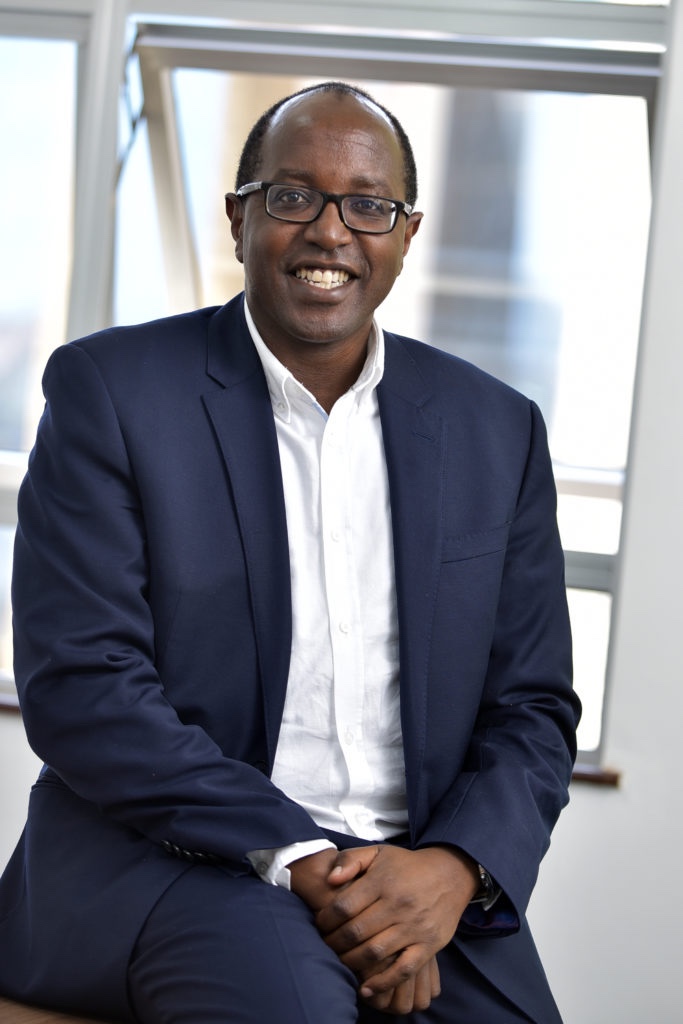In a mega scandal that is reportedly running into billions of dollars, a Kenyan executive has been ripped in the heist that’s ongoing at the South Sudanese State House.
By the time South Sudan became the world’s newest state in 2011, a cabal of military and civilian officials had already captured its main government institutions, enabled by a dizzying array of international actors seeking to profit from a rapidly developing kleptocracy. Factions that had formed during the long war for independence now turned their attention to competing over the control of this new state, which was blessed with billions of dollars of annual oil revenue and no checks and balances or transparency.
A looting frenzy ensued. Factionalization deepened as networks allied with President Salva Kiir and Vice President Riek Machar competed over the vast opportunities for mass theft of resources and state budgets. The uneasy calm only lasted two years before South Sudan erupted into a violent civil war pitting the two main factions against each other, adding to the many fault lines in the country.
During this period, Kiir and his associates had largely captured the state. Instead of providing services, supporting infrastructure, adjudicating disputes and protecting its people, South Sudan’s governing institutions were hijacked and repurposed for the personal enrichment of Kiir and his clique. Billions of dollars have gone missing and the government has done little for the welfare of its population. This corruption attracted foreign opportunists, who flocked to South Sudan.
South Sudan’s governing institutions were hijacked and repurposed for the personal enrichment of Kiir and his clique.
Every incident The Sentry examined had links to an international corporation, a multinational bank, a foreign government or high- end real estate abroad. This report provides several illustrative examples of international actors linked to violence and grand corruption in South Sudan.
South Sudan government officials are widely known for looting public coffers shamelessly that they even gobbled COVID-19 money in the height of the pandemic.
According to The Sentry, a US based investigative outfit looking into South Sudan’s plunder, government officials are to blame for the bleeding of the country as they collaborate with willing institutions to milk dry the war torn country.
According to Sentry, the men who liberated South Sudan proceeded to hijack the country’s fledgling governing institutions, loot its resources, and launched a war in 2013 that has cost hundreds of thousands of lives and displaced millions of people.
They did not act alone. The South Sudanese politicians and military officials ravaging the world’s newest nation received essential support from individuals and corporations from across the world who have reaped profits from those dealings. Nearly every instance of confirmed or alleged corruption or financial crime in South Sudan examined by The Sentry has involved links to an international corporation, a multinational bank, a foreign government or high-end real estate abroad. The report examined several illustrative examples of international actors linked to violence and grand corruption in order to demonstrate the extent to which external actors have been complicit in the taking of South Sudan.
The local kleptocrats and their international partners—from Chinese-Malaysian oil giants and British tycoons to networks of traders from Ethiopia, Eritrea, Kenya and Uganda—have accumulated billions of dollars.
The country’s natural resources have been plundered, lethal militia and military units responsible for atrocities have received financing and kleptocrats have lined their pockets with untold billions of dollars allocated by government programs meant to improve the livelihood of some of the poorest, most vulnerable people in the world. The spoils of this heist are coursing through the international financial system in the form of shell companies, stuffed bank accounts, luxury real estate and comfortable safe havens around the world for the extended families of those involved in violence and corruption.
Talking of shell companies and international players’ role in the plundering of South Sudan, the latest report by The Sentry has named a Kenyan executive as being part of the ring that is being used in money laundering of the proceeds from dirty deals.
According to the report seen by Kenya Insights, Sam Gakunga, a board member of the Kenyan National Oil Company (NOCK) has been roped in the heist.
Kur Ajing Ater and Benjamin Bol Mel Kuol, two influential South Sudanese businessmen who are sanctioned by the United States (US) and are part of President Salva Kiir’s inner circle, are potentially skirting US sanctions, according to an investigation by The Sentry.

According to the U.S. Department of the Treasury’s Office of Foreign Assets Control (OFAC), they were sanctioned for their involvement in bribery, kickbacks and procurement fraud with senior government officials. OFAC designated these individuals and entities pursuant to Executive Order (E.O.) 13818, which builds upon and implements the Global Magnitsky Human Rights Accountability Act and targets perpetrators of serious human rights abuse and corruption.
Several companies that have received billions in US dollar-denominated contracts from the government of South Sudan over the last three years are owned by relatives of Ajing and Bol Mel, who are the likely beneficial owners, according to incorporation records, contracts, and social media posts reviewed by The Sentry. These companies were registered after Ajing and Bol Mel were designated for sanctions by the US.
Debra LaPrevotte, Senior Investigator at The Sentry, said: “The awarding of lucrative government contracts to companies beneficially owned by sanctioned individuals is a sad indication of the Kiir regime’s lack of interest in fighting corruption. The activities detailed in our recent investigation further expose the unchecked looting of the country’s wealth and resources, as those in power continue to line their pockets, undermine stability, and sell out South Sudan’s future.”
Justyna Gudzowska, Director of Illicit Finance Policy at The Sentry, said: “A well-worn scheme for sanctioned persons to evade the internal compliance controls at banks is to establish new companies with unsanctioned associates and family members serving as proxies. Financial institutions should urgently tighten up their compliance systems to identify and scrutinize such potential proxies. Most critically now, banks and other financial institutions should be on the lookout for, and conduct appropriate due diligence on, the individuals and entities spotlighted in this report.”
According to the Sentry, the size of the contracts, totaling over $4 billion, and Ajing and Bol Mel’s level of influence and access in Juba make it likely that officials involved in the contracting process knew the alleged beneficial owners of the companies. The United Nations Panel of Experts on South Sudan has flagged at least one of the contracts given to a Bol Mel-connected company, ARC Resources, for inconsistencies with the national budget.
“The Sentry was able to verify that at least some of these contracts were no-bid, indicating that government spending continues to provide opportunities for large-scale corruption. The fact that the contracts were in US dollars makes it likely that the funds have touched the US financial system,” The Sentry report warned.
In September 2020, a series of confidential financial documents were published on social media accusing “Maj. Gen. Dr. Benjamin Bol Mel of amassing wealth through tax evasion and unlawful tax exemptions from the Ministry of Finance and the National Revenue Authority (NRA) worth over 30 billion US dollars for unspecified goods being imported into South Sudan between 2019 and 2020”.
According to these documents, Dr. Bol registered new companies namely African Resource Corporation and Equip Logistics Co. Ltd using his daughter Awut Bol Mel, cousins Kuol Akol Wieu and Adhieu Kuol Akol and Deng Deng Akuei as shareholders of this companies. This is to evade sanctions imposed on him by the United States of America in December 2017.
Among the leaked documents also are two new passports of Dr. Benjamin Bol Mel under different names so as to evade travel restrictions imposed on him due to the US Government sanctions.

In December 2017, Bol Mel and two companies in his vast corporate network, ABMC Thai-South Sudan Construction Company (ABMC) and Home and Away LTD, were designated by the US pursuant to Executive Order 13818 (Global Magnitsky) for their involvement in corruption in South Sudan.
Bol Mel was then the president of ABMC and had served as chairman of South Sudan’s Chamber of Commerce, Industry, and Agriculture, a position that he still holds. He has also served as a principal financial advisor and secretary to Kiir. With Bol Mel at the helm, ABMC was awarded tens of millions of dollars in government road construction contracts, for which the government did not hold competitive tender processes.
In a report released in 2012 by the Auditor General of National Audit Chamber, Bol Mel through his ABMC company was paid nearly 2 Billion US dollars for road projects in South Sudan. To date, Bol has not delivered a single road projects despite being paid billions of US dollars. One wonder why would anyone in his right mind award such a huge contract to an individual who failed to deliver on the same project before.
Since 2017, at least three new road construction companies connected to Bol Mel were registered in South Sudan: Winners Construction, ARC Resources (ARC), and Save Nation. Collectively, these companies have reportedly been awarded road construction and other infrastructure project contracts worth at least $3.5 billion. These contracts appear to be oil-backed, no-bid contracts, in violation of the 2018 Public Procurement Act.
ARC has been awarded a multi-billion contract to construct Juba-Bor-Renk Highway. To pay for this road project, the Government of South Sudan has allocated almost the entire Nile Blend crude oil to Benjamin Bol through his ARC company. So far the Government of South Sudan has paid over 150 Million US dollars to ARC. The company has also been allocated another whooping 150 Million US dollars from the loan worth 250 Million US dollars that South Sudan is getting from Afri-Exim Bank.
As per the contract with the Ministry of Roads and Bridges, ARC is expected to complete Juba-Bor-Renk Highway in three years. A senior engineer from the Ministry of Roads and Bridges says, “it will be a miracle to for the road to be completed in three years”. He added that “one year has already gone since the road project started yet ARC has not even completed even quarter of the road from Juba to Bor, leave alone Juba-Bor-Renk”.
The United States Government sanctioned Benjamin Bol Mel for “corruption, bribery and human rights abuses” in 2017. His two companies ABMC – Thai South Sudan Construction Company Limited and Home & Away Limited were also sanctioned. According to the US Government, “Dr. Benjamin Bol is the principal business partner and financial advisor to President Salva Kiir Mayardit”. Analysts believe that sanctioning Bol Mel who is seen as a close business partner and financial confidant of President Salva Kiir is “sending a direct message to President Kiir to distant himself from Bol Mel or else he too could be place under US sanctions”.
“It is unfortunate that President Salva Kiir continue to award huge contracts to an individuals sanctioned by the US Government. This is literally showing the US Government a “middle finger”. The decision to award this contract to Bol Mel will further lead to deterioration of relationship between South Sudan and the United States”, said the analyst who spoke to South Sudan Post. He added that President Salva Kiir Mayardit should distant himself from Benjamin Bol Mel, Kur Ajing Ater and other businessmen who have been sanctioned by the US Government or else South Sudan as a country risk being place under sanctions by the US Government which could leads to collapse of the economy of the country leading to political unrest and a return to civil war.
Kenya Insights has learnt that Sam Gakunga a close associate of Bol Mel was brought in to create the shell company Equip Logistics where he’s listed as a director to skirt the US sanctions and continue with the mega plunder. Gakunga from reports is said to be a close associate of President Kiir and has allegedly been used as a conduit in their money laundering schemes.
Gakunga co-owns three other companies with Bol Mel for the same purposes as alleged in the report. Main purpose of being proxy for the sanctioned businessmen.
Government documents show that Equip Logistics received a five-year tax exemption on imports from the Ministry of Finance in January 2019.

The Sentry’s investigation suggests that South Sudanese businessman Kur Ajing Ater has used his wife, Christine Achol Akot, to incorporate a new company and continue to receive lucrative government contracts after having been designated by the United States.
In October 2019, the United States imposed sanctions on Ajing and one of his companies, Lou Trading and Investment Company Limited, for “involvement in bribery, kickbacks and procurement fraud with senior government officials in South Sudan,” pursuant to Executive Order 13818 (Global Magnitsky).
Just three weeks after this designation, Amuk for Trad- ing and Investment was incorporated in South Sudan. Within a few months, South Sudan’s Ministry of Defence began to award the newly established Amuk contracts totaling more than a billion US dollars to supply the country’s military with food, including a $539.4 million contract in March 2020 and a $644 million contract in September 2020.
The Ministry of Defence recommended Amuk as a single source supplier due to urgent need, which could indicate that the September 2020 contract was no-bid. Amuk was represented by its CEO, Christine Achol Akot, in the September 2020 deal.10 The Sentry’s analysis of social media and aspects of the contract found that Akot is Ajing’s wife.Related Content: Forgotten Files: Reviving The Case Of Bernard Masiga Ayienga The NYS Theft Suspect Living Like A King On sh160,000 Salary
In addition, the phone number for Amuk ulti- mately traced back to Ajing. The incorporation of a new company—one that is represented by a close family member and that received very similar no-bid contracts to Lou Trading, violating the spirit of the 2018 Public Procurement Act immediately after Ajing’s designation raises red flags for potential corruption and sanctions evasion.
On July 2, 2021, the government of South Sudan issued a sovereign guarantee in the amount of $650 million to the Dubai-based company Silwana Diamond General Trading, according to documents reviewed by the Sentry. The guar- antee is related to a 10-year, $5.9 billion infrastructure partnership between the government of South Sudan, Silwana, and Amok for Trading and Investment. Ajing appeared as one of the signatories at the contract signing ceremony in Dubai, suggesting he is linked to Amok for Trading. On September 28th, it was reported that Kiir canceled this sovereign guarantee. A letter from Kiir’s executive director stated that the guarantee “threatened to roll back gains” the country had made with its “population and development partners.”
While declaring his intention to crossover to the opposition in May this year, South Sudan army commander General Stephen Buay Rolnyang who was dismissed from active army service in 2019 in a statement said the following about corruption in the government and links with Bol.
“ABMC and now ARC company. President Kiir channels all the money of the country to the company of Benjamin Bol Mel to eat from there on the pretext of making roads. The president doesn’t allow other companies to compete with the ARC company of Bol Mel. He gave all the road projects of this country to Mr. Bol Mel to be the one to construct all the roads of South Sudan.”
“How do you expect these roads to finish in time when only one company is allowed to build the roads? Secondly, this company we are talking about is under sanction. Why doesn’t the president allow other companies to come in and bid for road construction if the president wants to make good development in the country?”
The report by The Sentry and which now puts Sam Gakunga in a tight spot recommended that the United States Treasury Department should investigate and, if appropriate, impose sanctions according to Executive Order 13818 (Global Magnitsky) on the individuals and entities named in this report: Amuk for Trading and Investment Co Ltd; Christine Achol Akot; Kuol Akol Wieu; Africa Resource Corporation (ARC); Save Nation Co. Ltd.; Winners Construction Co. Ltd.; and Equip Logistics Co. Ltd.
“The US should also engage partners in the United Kingdom (UK) to urge them to designate Ajing, Bol Mel, and their networks using the UK’s new anti-corruption sanctions authority,” The report recommended. The US government should amend the South Sudan and Global Magnitsky Executive Orders to include a provision concerning immediate family members of sanctioned individuals.”
Should this measure take place, Gakunga and accomplices who’ve been aiding the businessmen to skirt US sanctions are facing a possible US-sanctions and if Kenya being a good partner of the US could also investigate further his involvement in the heist and take any action including freezing of assets.
The other recommendation was that the US Financial Crimes Enforcement Network (FinCEN) should update the existing 2017 advisory on political corruption risks in South Sudan to include sanctions evasion red flags.
“FinCEN advisories play a critical role in anti-corruption and sanctions enforcement efforts. Both US and international banks should be alerted to pay closer attention to collecting information on South Sudanese entities under sanctions,” The Sentry said. “The US should continue to engage South Sudan on taking steps to build strong corporate transparency, oversight, and accountability mechanisms. Sanctions are often only as effective as their implementation.”
The report also suggested that the US should closely engage South Sudan’s government and relevant stakeholders on sanctions enforcement and better implementation of anti-money laundering and countering the financing of terrorism (AML/CFT) laws.
“South Sudan’s government should enforce the country’s AML/CFT laws. South Sudan’s existing AML/CFT legal framework is plagued by a lack of implementation and a dearth of accountability mechanisms, opening the door to misconduct. To shield its financial system from future abuse, the government of South Sudan should take steps to operationalize its AML/CFT statutes,” the report recommended.
The Sentry is an investigative and policy team that follows the dirty money connected to African war criminals and transnational war profiteers and seeks to shut those benefiting from violence out of the international financial system.
Stay tuned to Kenya Insights for our next episode where we will breakdown how the two influential businessmen Kur Ajing Ater and Benjamin Bol Mel Kuol hiding in plain eyesight have been playing the system and managed to hold by the balls even the President as they mint billions from the bleeding country.
There's no story that cannot be told. We cover the stories that others don't want to be told, we bring you all the news you need. If you have tips, exposes or any story you need to be told bluntly and all queries write to us [email protected] also find us on Telegram

